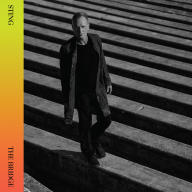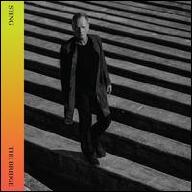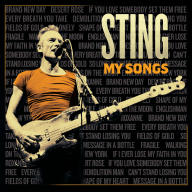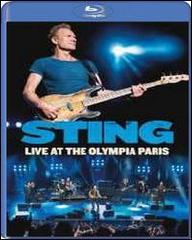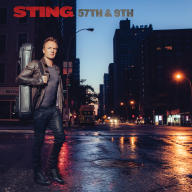Born Gordon Sumner, Sting grew up near the shipyards of Wallsend, Northumberland, England, the eldest son of a milkman and a hairdresser. As a child, Sumner fell in love with music, but it took him a while to pursue it as a career. He worked odd jobs before earning an education degree. As he taught at Cramlington's St. Paul's First School, he moonlighted as a jazz musician in Newcastle, playing bass with the Newcastle Big Band and the Phoenix Jazzmen. While playing with the latter outfit, he became known for wearing yellow and black sweaters, which earned him the nickname "Sting" from fellow musician and bandleader Gordon Solomon.
Sting became Sumner's stage name around the time he began playing in the jazz fusion outfit Last Exit in 1975. Last Exit is where he started sharpening his skills as a songwriter and branching out into rock. The band released the "Whispering Voices" single in 1975 -- the song wasn't written by Sting but by keyboardist Gerry Richardson -- on the small label Wudwink and it caught the ear of Carol Wilson, who was working for the publishing division of Virgin Records' Richard Branson. Buoyed by this attention, the group moved to London but they fell apart shortly after this relocation. While some of his bandmates headed back to Newcastle, Sting stayed in London, seeking out Curved Air drummer Stewart Copeland in hopes of a collaboration. As it happened, Curved Air had just split, so the pair joined forces with the intent of breaking into London's thriving punk scene.
Adding guitarist Henri Padovani, Sting and Copeland formed a nascent version of the Police. By March 1, 1977, they played their first gig and by May, they released the "Fall Out"/"Nothing Achieving" single on Illegal Records, an imprint co-founded by Copeland's brother Miles; both sides of the 45 were written by Stewart. Around the time the "Fall Out" single hit the stores, Mike Howlett -- a bassist who had just left the prog rock outfit Gong -- invited Sting to join him and guitarist Andy Summers to play in a group called Strontium 90. Howlett planned to bring drummer Chris Cutler, a veteran of the challenging Henry Cow, into the fold but he had other commitments, so Sting drafted Copeland as the group's drummer. During the early summer of 1977, Strontium 90 recorded a demo and played a pair of concerts, including a debut at a Gong reunion show in Paris. Despite this activity, Strontium 90 dissolved quickly and Sting asked Summers to join the Police. The Police briefly existed as a quartet with both Summers and Padovani, but by August the new recruit insisted that he be the group's only guitarist. Shortly afterward, Padovani was dismissed and the Police became a trio.
The Police began gigging in earnest late in 1977, but the group found it difficult to build an audience. Strapped for cash, they agreed to play in a commercial for Wrigley's gum, dying their hair blond as part of the agreement. Although the spot never aired, the commercial wound up giving the group their distinctive bleached-blond look. Not long afterward, Copeland's brother Miles underwrote the recording of the band's debut, Outlandos d'Amour. Seeing potential in "Roxanne," Miles became the Police's manager and secured the group a deal with AM Records.
Copeland managed to stir up some controversy regarding the single release of "Roxanne" and its successor "Can't Stand Losing You." Upon its April 1978 release, "Roxanne" never made it onto the BBC's playlists, which Copeland spun into the single being "Banned from the BBC" -- a label that stretched the truth but was slapped onto the initial singles of "Roxanne." Despite this commotion, the single didn't chart. "Can't Stand Losing You" wound up getting banned from the BBC due to the single's cover art -- a tongue-in-cheek depiction of suicide by hanging -- and the Police parlayed that into a modest 42 placement on the U.K. charts in late summer 1978. "So Lonely," the group's third single, didn't chart at all.
Britain may not have been paying attention to the band but where the Police were gaining traction was in North America. "Roxanne" wound up cracking the Top 40 in both the U.S. and Canada in early 1979, which at that time was a rarity for punk bands. The stateside success was enough to get "Roxanne" re-released in the U.K., where it went to 12, followed by a number two placement for the re-release of "Can't Stand Losing You." With some chart momentum on their side -- they were popular enough to have a re-release of "Fall Out" scrape the U.K. singles chart -- the Police embarked on an extensive American tour, completing a new album in the meantime. Entitled Reggatta de Blanc, their second album went to number one upon its October 1979 release, partially on the strength of the number one singles "Message in a Bottle" and "Walking on the Moon." Neither single charted in the U.S. Top 40 -- the latter made it all the way to 74 -- but Regatta de Blanc still climbed to number 25 on the Billboard Top 200, while its title track snagged the group their first Grammy for Best Rock Instrumental Performance.
The Police scored another U.K. hit in February 1980 when "So Lonely" reached six upon its re-release, but the year is better remembered as the group's international breakthrough thanks to Zenyatta Mondatta. Delivered in October 1980, the record reached number one in the U.K. and number five in the U.S., with its first single, "De Do Do Do, De Da Da Da Da," becoming the group's first American Top 10 hit; in the U.K., it was the record's second single, reaching number five. "Don't Stand So Close to Me," released as Zenyatta Mondatta's first single in the U.K. and as its second in the US, eclipsed its companion, reaching number one in the U.K. and a Duo or Group With Vocal. "Behind My Camel," an album track from Zenyatta Mondatta, also earned the trio the Grammy for Best Rock Instrumental Performance that year.
High on their chart success, the Police headed to Montserrat to record their fourth album with producer Hugh Padgham. The resulting Ghost in the Machine appeared in the fall of 1981, topping the U.K. charts and scaling its way to number two in the U.S. The rise of Ghost in the Machine was fueled by "Every Little Thing She Does Is Magic," a Top Ten hit throughout the world which was also a staple on MTV. "Spirits in the Material World" was another international hit, reaching 11 in the U.S. and 12 in the U.K., while "Invisible Sun" reached number two in the U.K. Ghost in the Machine also increased the Police's presence on album rock radio, as evidenced by "Secret Journey" reaching 46 in the U.S.
During the reign of Ghost in the Machine, the individual members of the Police seized the opportunities brought by success. Sting resumed the acting career he attempted to launch in 1979, when he appeared in Franc Roddam's silver screen adaptation of the Who's rock opera Quadrophenia. He appeared in the film Brimstone and Treacle -- its soundtrack featured three new Police songs, including a "I Burn for You" -- and had a key role in David Lynch's 1984 adaptation of Frank Herbert's Dune. Copeland was also drawn to Hollywood, composing the score for Francis Ford Coppola's Rumble Fish. Meanwhile, Summers collaborated with Robert Fripp for the 1982 LP I Advance Masked.
All this success was dwarfed by Synchronicity, the 1983 album that turned into a multi-million blockbuster. Much of that success was due to "Every Breath You Take," an ominous ballad that topped the charts in both the U.S. and U.K. "Every Breath You Take" became an instant standard, winning the Grammy for Song of the Year along with Best Pop Performance by a Duo or Group with Vocal. BMI would later name "Every Breath You Take" its most performed song, as it racked up over 15 million radio plays. The ballad wasn't the only hit on Synchronicity. "Wrapped Around Your Finger" and "King of Pain" both reached the Top 10 in the U.S. -- the former only went to 17 in the U.K. -- and "Synchronicity II" turned into a hit on MTV and the radio, peaking at 16 on the Top 40; "Synchronicity II" also took home the Grammy for Best Rock Performance by a Duo or Group.
Synchronicity dominated 1983, spending 17 weeks on the top of the U.S. charts, vying for the position with Michael Jackson's Thriller. The Police supported the album with a stadium tour that spilled into 1984, but Sting started to grow restless with the trio. Following the tour's completion in March 1984, the group went on hiatus. Sting turned his attention to recording his debut, The Dream of the Blue Turtles. Working with a group featuring Branford Marsalis, Kenny Kirkland, and Omar Hakim represented something of a return to roots for Sting, but its jazz inclinations illustrated his range. In America, "If You Love Somebody Set Them Free" and "Fortress Around Your Heart" gave Sting two Top Ten hits, while "Love Is the Seventh Wave" and "Russians" charted at 17 and 16 on Billboard's Top 40, respectively. The record didn't fare quite as well in the U.K.: "Russians," the last single pulled from the album, was its biggest hit, reaching 12, while "If You Love Somebody Set Them Free" peaked at 26 and the other two singles didn't crack the Top 40. Despite this underperformance on the charts, Sting was inescapable throughout 1985. He sang the "I want my MTV" refrain on Dire Straits' smash hit "Money for Nothing," he cameoed on records by Phil Collins, Miles Davis, and Arcadia alike, he appeared on Hal Willner's Lost in the Stars: The Music of Kurt Weill tribute album and he took his Dream of the Blue Turtles out on the road on a tour that was captured on Michael Apted's documentary Bring on the Night, which was released toward the end of the year. The soundtrack to the film was released in 1986 and the video release took home the Grammy for Best Music Video, Long Form at the 1987 ceremony.
The Police reconvened in June 1986 to play three concerts on the Amnesty International: A Conspiracy of Hope tour, which led to the group attempting to record a new album that July. Prior to heading into the studio, Copeland broke his collarbone in a horse riding accident. The injury exacerbated simmering tensions within the group and the trio wound up completing just one track: a new version of "Don't Stand So Close to Me." Attached as a new track on the compilation Every Breath You Take: The Singles, and the song was a modest hit. Following its release, the band separated, this time for good.
Sting wasted no time in returning to his solo career, completing his second solo album, Nothing Like the Sun. A double album that ran the length of a full CD -- a rarity at the time -- Nothing Like the Sun found Sting expanding his horizons, collaborating with the legendary jazz arranger Gil Evans and deepening his interests in worldbeat. None of this could be heard on its funky first single "We'll Be Together," which wound up climbing to seven in the U.S. The "Be Still My Beating Heart" made it to 15 in the U.S. but in the U.K., none of the album's singles entered the Top 40; a Ben Liebrand remix of "Englishman in New York" belatedly went to 15 in 1990. Despite the lack of big hits, Nothing Like the Sun won the award for Best British Album at the 1988 Brit Awards, and it was a multi-platinum hit throughout Europe and in the U.S.
Sting reinterpreted five songs from Nothing Like the Sun for his 1988 EP Nada Como el Sol, which was sung entirely in Spanish and Portuguese. Once again, Sting seized opportunities to collaborate with seemingly every musician who came his way. Gil Evans decided to record a collection of Sting's songs for a big-album and the songwriter joined the proceedings. Sting cameoed on Frank Zappa's 1988 LP Broadway the Hard Way, singing "Murder by Numbers," and he participated in a 1988 recording of Stravinsky's The Soldier's Tale, which also featured Ian McKellen. His theatrical ambitions continued to flourish in 1989, when he appeared in a Broadway revival of The Threepenny Opera.
Sting returned in 1991 with The Soul Cages, a meditative album dedicated to his deceased father (Nothing Like the Sun was, in part, a tribute to his departed mother). "All This Time" went to five on Billboard's Hot 100, but none of the subsequent singles charted in the Top 40; in the U.K., "All This Time" went to 15. In 1992, "It's Probably Me" -- a slow-burner from the Lethal Weapon 3 soundtrack featuring Eric Clapton on guitar -- wound up as a solid hit, peaking at 20 in the U.S. and 30 in the U.K., but it was somewhat overshadowed by Sting's marriage to actress and film producer Trudie Styler; the couple would have four children.
Bearing a punning title, Ten Summoner's Tales arrived in 1993 and proved to be a solid success on both sides of the Atlantic. It had two big hits pop hits -- "If I Ever Lose My Faith in You" was 14 in the U.K., 17 in the U.S., "Fields of Gold" went to 16 and 23 -- but the album saw Sting's audience shift to adult contemporary; on that chart, the album's two singles went Top Ten, with "Fields of Gold" spending five weeks at number two. This transition was highlighted by the smash success of "All for Love," a song recorded with Bryan Adams and Rod Stewart for the Three Musketeers soundtrack. It swept across the globe at the end of 1993, reaching number one in the U.S., Australia, and many European countries; in the U.K. it reached two.
The success of Ten Summoner's Tales set up the 1994 release of the greatest-hits compilation Fields of Gold: The Best of Sting 1984-1994. "When We Dance," a new track added to the collection, reached nine in the U.K., his best solo placing ever in the country; in the U.S., it went to 38 and number 12 on the Adult Contemporary charts. "This Cowboy Song" gave him another U.K. hit in 1995, reaching 15.
In 1996, Mercury Falling didn't do great business in the U.S. -- none of its singles went higher than 60 -- but in the U.K., "Let Your Soul Be Your Pilot" went to 15, with "You Still Touch Me" and "I Was Brought to My Senses" reaching the Top 20. In 1997, "I'm So Happy I Can't Stop Crying," the record's final single, was released in two variations: one containing the album version, one as a duet with rising country star Toby Keith. While neither cracked Billboard's Top 40, the original version was a number 28 Adult Contemporary hit and the Keith duet reached number two on the Country charts. Sting had another notable duet in 1996, when he sang on "On Silent Wings," a number 13 U.K. hit for Tina Turner.
"Roxanne 97," which was a Puff Daddy remix of the original Police hit, went to 17 in the U.K. in 1997 and was featured on that year's compilation The Very Best of Sting The Police. In 1998, he made a cameo in Lock, Stock and Two Smoking Barrels, the first film from Guy Ritchie; it was executive produced by Trudie Styler.
In 1999, Brand New Day's title track went to 13 in the U.K., but it was "Desert Rose," a duet with Cheb Mami, that was the international smash: it reached the Top 10 in many European countries in 2000, 15 in the U.K. and 17 in the U.S. Brand New Day wound up winning Best Pop Vocal Album and Best Male Pop Vocal Performance in the 2000 Grammy ceremony. Overall, Brand New Day sold eight million copies around the world, making it his biggest album.
"My Funny Friend and Me," a song included on The Emperor's New Groove soundtrack in 2000, earned Sting his first Oscar nomination for Best Song; he didn't win. The song kicked off a decade where Sting didn't have as many hits, but he worked constantly, collaborating with everybody from Yo-Yo Ma to Black Eyed Peas, while dedicating himself to lower-profile solo work. Among the latter was All This Time, a 2001 live album recorded on the day of September 11; it was released that November, reaching three in the U.K. and 32 in the U.S. A memoir called Broken Music arrived in 2003 as did a new studio album, Sacred Love; it peaked at three in both the U.S. and U.K. Its lead single "Send Your Love" went to 30 in the U.K. and reached 29 on the U.S. Adult Contemporary chart, but it was eclipsed by two collaborations with R&B singers. First was Craig David's "Rise & Fall," which went to number two in the U.K., then Mary J. Blige duetted with Sting on "Whenever I Saw Your Name," which was added to a re-released version of Sacred Love; the recording won the pair Best Pop Collaboration With Vocals Grammy in 2004.
In 2007, the Police reunited for an extensive tour that ran into 2008. On the tour's final show, the group brought out original guitarist Henry Padovani to play "Next to You." Sting chose to wind down from the Police reunion with the 2009 holiday album If on a Winter's Night…, which concentrated on old folk tunes, hymns, and madrigals. He devoted his 2010 to performing highlights from his catalog with London's Royal Philharmonic Orchestra, unveiling the new arrangements on the July 2010 album Symphonicities, then heading out on the road with the orchestra; the tour was documented on the Live in Berlin album, which arrived in November 2010. 25 Years, a career-spanning box set, arrived in 2011, along with a single-disc sampler of highlights.
Sting completed his musical The Last Ship in 2013. Initially, he introduced the piece as a solo album released in September of 2013, with the musical -- set in a struggling shipyard in the '80s -- making its Broadway debut in 2014. Sting spent the next two years touring, sometimes co-headlining with Paul Simon, and then in late 2016, he released 57th 9th, his first album of pop songs in 13 years. The album was recorded in a few weeks with contributions from a pair of long-time collaborators, guitarist Dominic Miller and drummer Vinnie Colaiuta, plus drummer Josh Freese and guitarist Lyle Workman. In 2017, Sting was honored, alongside Wayne Shorter and Metallica, with the Polar Music Prize, an annual award originating in Sweden recognizing greatness in the world of music.
2018 brought an unlikely pairing as Sting issued a joint reggae album with Jamaican singer Shaggy. Obliquely titled 44/876 after the two musicians' country calling codes, it marked Sting's first-ever collaborative duo album as well as his return to the U.K. Top Ten chart; the album also went Gold in France. It won the Grammy for Best Reggae Album in 2019.
Sting reworked several standards from his past on 2019's My Songs. He supported the album with a tour. Early in 2021, he released a compilation of previously released collaborations called Duets and by the end of the year he delivered The Bridge, a record inspired by the disruption caused by the COVID-19 pandemic. ~ Stephen Thomas Erlewine, Rovi


